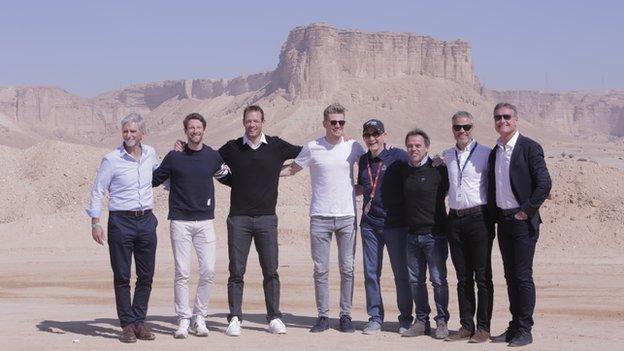Saudi Arabian Grand Prix on F1 provisional schedule for 2021 season
- Published

Damon Hill and Romain Grosjean were among the guests at the unveiling in January of plans for a new track, to be used from 2023
Saudi Arabia is set to make its debut on the Formula 1 calendar next year.
A race on a street circuit in Jeddah is the penultimate event on a draft calendar that has been shown to teams.
Jeddah will hold the Saudi Arabian Grand Prix while a new purpose-built track at Qiddiyah is completed, which is scheduled to be in 2023.
It is one of 22 races on a provisional 2021 schedule as F1 plans to return to a calendar as close to normal as possible after this year's disruption.
F1 is expecting criticism of the decision to race in Saudi Arabia because of the country's record on human rights.
Amnesty International UK said a Saudi Grand Prix would be "part of ongoing efforts to sports-wash the country's abysmal human rights record".
"The Saudi authorities apparently still see elite level sport as a means of rebranding their severely tarnished reputation," head of campaigns Felix Jakens said.
"In the lead-up to a race in Jeddah, we would urge all F1 drivers, owners and teams to consider speaking out about the human rights situation in the country." "If it goes ahead, at the very least F1 should insist that all contracts contain stringent labour standards across all supply chains, and that all race events are open to everyone without discrimination."
It is not the first international sport to hold an event in the country - golf, tennis and boxing have all held competitions in Saudi, and the all-electric Formula E racing series has had the country on its calendar since 2018.
A spokesperson for F1 emphasised that the calendar has not been announced yet but said: "For decades, F1 has worked hard to be a positive force everywhere it races, including economic, social, and cultural benefits.
"Sports like F1 are uniquely positioned to cross borders and cultures to bring countries and communities together to share the passion and excitement of incredible competition and achievement.
"We take our responsibilities very seriously and have made our position on human rights and other issues clear to all our partners and host countries, who commit to respect these rights in the way their events are hosted and delivered."
The first 10 races of the 2020 season were either postponed or cancelled because of the coronavirus pandemic.
The season starts in Melbourne, Australia in mid-March and then goes to Bahrain and includes nearly all the races that had been due to be held this year.
That means a return for long-established races such as China, Japan and Canada, which had to be cancelled because of the disruptions to international travel caused by Covid-19, as well as the debut of the Vietnamese Grand Prix.
F1 has been in conversations with the relevant national governments and all are said to be in agreement the races can take place, as things stand.
The Dutch Grand Prix, which had been due to return to the schedule for the first time since 1985 in April this year, is expected to be moved to the late summer and could be twinned with the Belgian race at Spa.
The big omission from a standard calendar is Brazil, where F1 is in dispute with the promoter at Sao Paulo's Interlagos track, which has held the race since 1990, and a new track planned in Rio de Janeiro is not ready and mired in controversy over environmental disruption.
If Brazil makes it on to the calendar in 2021, that will take the number of races to 23.

Halloween and pumpkins: How can you make the most of them?
Children in Need: Find out how you can get involved and make a difference
